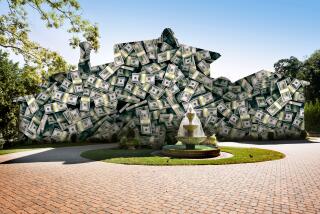‘A Return to Equity’
- Share via
Lately it has become the vogue among people writing about property taxes to refer to Proposition 13 as unfair and divisive. There is a trend toward “equalizing” property taxes, and given the greed of government, equalization will inevitably mean higher taxes for all. Perhaps a review of the causes of Proposition 13 is in order.
In 1970, I purchased a house for $34,950. The annual property tax was $765, or 2.1% of market value. In 1978 the appraised value had increased 273% to $95,500. The annual property tax was to be $3,150, a 412% increase, and 3.2% of value.
Proposition 13 reduced my appraisal value to $55,000 and my tax to 1% of value, or $550. This initial tax is still 1% of market value for any home sale, with the value fixed by the actual price paid. Thus, a buyer would have to pay $315,000 in order to pay the taxes I would have been required to pay in 1978.
In a word, the tax burden is not oppressive on the new buyer. If he can’t afford the 1% tax now, he most certainly could not afford the tax under the old “equitable” method. A tax of 1% is certainly as fair as a 6 1/2% tax on say automobiles, where the purchaser is forced to pay higher prices for the same model car than in prior years.
If an attempt is made to achieve some form of equity in the “blatantly unfair” present structure, the sure, certain, inevitable result will be higher taxes for all and the beginning of a return to the runaway tax rates, which brought on Proposition 13 in the first place.
WILLIAM G. MILLER
Woodland Hills
More to Read
Inside the business of entertainment
The Wide Shot brings you news, analysis and insights on everything from streaming wars to production — and what it all means for the future.
You may occasionally receive promotional content from the Los Angeles Times.










